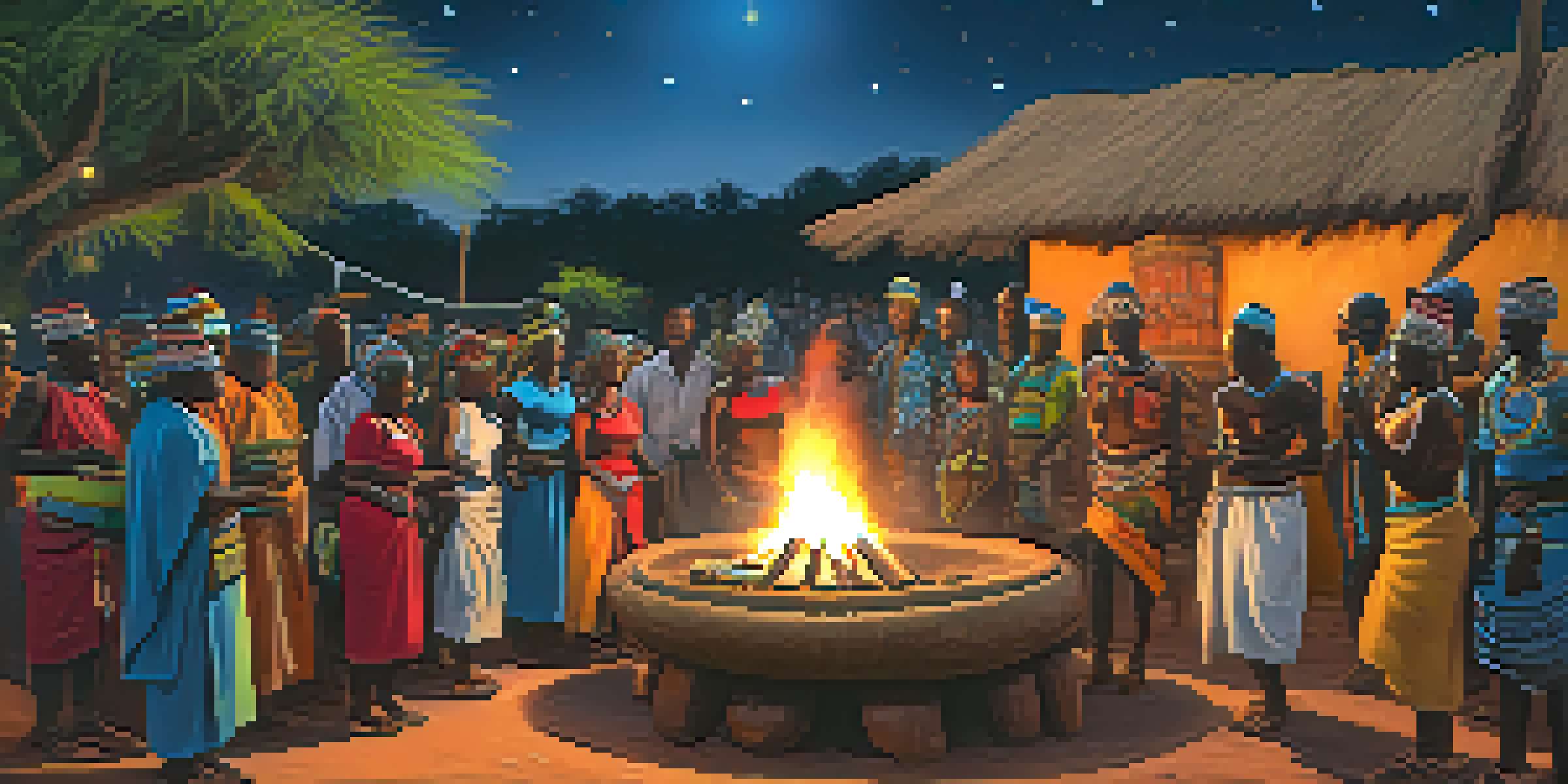The Role of Cannabis in African Spiritual Practices

Historical Context of Cannabis in African Cultures
Cannabis has a long-standing history in various African cultures, often used in spiritual and medicinal contexts. Ancient texts and oral traditions suggest that it has been utilized for centuries, with roots tracing back to early civilizations. The plant is not merely a recreational substance; it has been woven into the fabric of cultural practices and is seen as a sacred herb.
Cannabis is a tool for spiritual connection, enhancing the ability to connect with spirits and ancestors.
In many communities, cannabis is revered for its psychoactive properties, believed to open pathways to the spiritual realm. It's used in rituals to connect with ancestors, fostering a sense of community and shared beliefs. This historical significance showcases how cannabis was integrated into the spiritual lives of African people long before modern interpretations.
Today, as societies evolve, the perception of cannabis continues to shift, yet its historical roots remind us of its deep connections to spirituality and cultural identity. Understanding this context is essential for appreciating its role in contemporary practices.
Cannabis as a Tool for Spiritual Connection
In many African spiritual practices, cannabis is viewed as a facilitator of communication with the divine. Practitioners often use the herb during ceremonies, believing it enhances their ability to connect with spirits and ancestors. This connection fosters a sense of belonging and guidance in their spiritual journeys.

For instance, in Rastafarian culture, which has African roots, cannabis is known as 'ganja' and is celebrated for its spiritual properties. It’s used in rituals and gatherings, providing a communal experience that strengthens bonds among participants. This illustrates how cannabis serves not only as a personal tool but as a collective medium for spiritual expression.
Cannabis' Historical Significance
Cannabis has deep roots in African cultures, where it has been integral to spiritual and medicinal practices for centuries.
The act of consuming cannabis during these practices can alter consciousness, allowing individuals to access deeper states of awareness. This transformation is a central aspect of many traditional rituals, highlighting the plant's significance beyond mere consumption.
Cannabis Rituals and Ceremonies Across Africa
Different African cultures have unique rituals involving cannabis, each reflecting their distinct spiritual beliefs. For example, in some West African tribes, cannabis is used in initiation ceremonies, symbolizing a rite of passage into adulthood. This practice signifies not only personal growth but also a deeper connection to community and tradition.
The future of cannabis in African spirituality will likely involve a nuanced dialogue between tradition and modernity.
In other regions, cannabis may be included in healing ceremonies, where it is believed to help restore balance between the physical and spiritual realms. The use of cannabis in these contexts often emphasizes its role in promoting mental clarity and emotional well-being, underscoring its importance in holistic healing.
These rituals demonstrate how cannabis is not just an isolated practice but part of broader cultural narratives. They highlight the intersection of spirituality, community, and identity, illustrating the multifaceted role cannabis plays in African societies.
The Medicinal Aspects of Cannabis in Spiritual Practices
Cannabis is not only used for spiritual purposes but also for its medicinal benefits, which are often intertwined with spiritual practices. Many African healers incorporate cannabis into their treatments for various ailments, believing in its healing properties. This duality of use reflects a comprehensive understanding of health that encompasses both body and spirit.
For instance, in traditional medicine, cannabis might be prescribed for pain relief or to alleviate anxiety, serving as both a physical remedy and a spiritual aid. Healers often blend these practices, using cannabis during rituals to enhance the therapeutic effects and promote healing on multiple levels.
Spiritual and Medicinal Use
In African spirituality, cannabis is both a tool for enhancing spiritual connections and a remedy for various ailments, reflecting a holistic approach to health.
This integration of medicinal and spiritual uses highlights the significance of cannabis in African cultures, where the line between physical health and spiritual well-being is often blurred. It showcases a holistic approach to health that continues to resonate in modern practices.
Modern Perspectives on Cannabis in African Spirituality
In contemporary Africa, the role of cannabis in spiritual practices is evolving, influenced by globalization and changing societal attitudes. While some communities continue to uphold traditional practices, others are re-evaluating the place of cannabis within their spiritual frameworks. This shift often leads to a blending of old and new beliefs.
The increasing acceptance of cannabis in various parts of the world has sparked discussions around its legalization, which can impact its spiritual significance. As more people explore its benefits, there’s a growing interest in its traditional uses, prompting a revival of ancient practices that honor its spiritual roots.
This modern perspective creates a dynamic dialogue about the significance of cannabis, allowing for a reimagining of its role in spiritual practices. It encourages individuals to explore their heritage while considering contemporary implications, fostering a deeper understanding of this sacred plant.
Cultural Significance of Cannabis in Community Practices
Cannabis often plays a vital role in community gatherings and celebrations in various African cultures. It serves as a social lubricant, bringing people together to share stories, music, and dance. These communal experiences reinforce social bonds and allow for the expression of cultural identity through shared rituals involving cannabis.
In many cases, the act of consuming cannabis is accompanied by storytelling or music, reflecting a rich tapestry of cultural heritage. These gatherings not only honor traditions but also create spaces for healing and connection among community members. The communal aspect of cannabis use highlights its importance as a unifying force.
Modern Challenges Ahead
The evolving perception of cannabis in Africa faces challenges from legal restrictions and social stigma, prompting a need for cultural preservation.
By fostering these connections, cannabis becomes a symbol of unity and cultural pride, reminding individuals of their shared history and values. This cultural significance illustrates how cannabis transcends its physical properties, serving as a vessel for community expression and identity.
Challenges and Future of Cannabis in African Spirituality
Despite its rich history, the role of cannabis in African spirituality faces numerous challenges, including legal restrictions and social stigma. Many practitioners are navigating these obstacles while striving to preserve their traditions. This struggle often highlights the tension between modern laws and ancient practices, raising questions about cultural preservation.
As global attitudes toward cannabis continue to shift, there is potential for greater acceptance and understanding of its spiritual significance. Advocates are working to educate communities about the historical and cultural importance of cannabis, aiming to foster respect for its traditional uses. This effort is crucial in ensuring that the spiritual practices surrounding cannabis are not lost.

Looking ahead, the future of cannabis in African spirituality will likely involve a nuanced dialogue between tradition and modernity. By addressing challenges and embracing change, communities can continue to honor their ancestral practices while adapting to contemporary realities, ensuring the legacy of cannabis in spirituality endures.